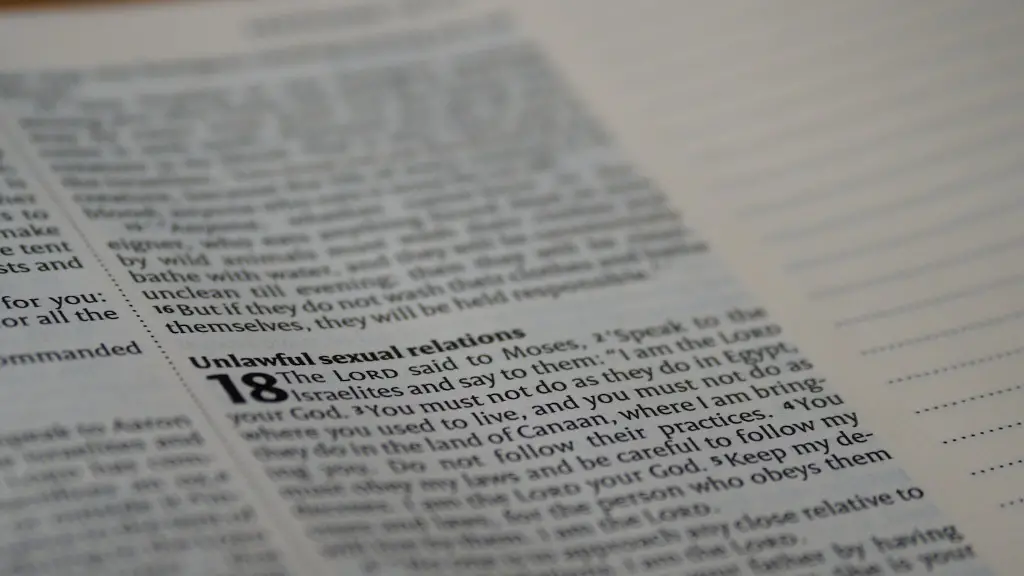We’ve all heard stories of entire sections of the Bible being missing, or censored. But are there any books of the Bible that are actually missing? This article takes an in-depth look at this myth, to explain why it perpetuates, and to explore what books of the Bible may have been lost over the centuries.
First, it’s important to understand that the Bible is comprised of 66 books, 39 in the Old Testament, and 27 in the New Testament. The books of the Bible are grouped into genres like history, law, wisdom, and prophecy, largely based on their content. This selection process was a long process, carried out by the ancient rabbis and church leaders, over the course of centuries.
The myth of there being “lost books” of the Bible originates from the fact that some of these books weren’t included in the official canon. This is often attributed to religious bias, with some books being chosen for inclusion (or exclusion) for political or ideological reasons. However, many of the excluded books were excluded because their spiritual content or message was considered unreliable, or was viewed as being too closely related to already existing books.
In addition, it’s important to note that, while there may be some books or parts of books missing from the Bible, there is no evidence to suggest that any of these are actually “lost”. The books that were excluded from the canon, such as the Apocrypha, are still available in some form, and can be studied by interested readers.
It’s also worth noting that, while there may have been some books or parts of books that were excluded, this doesn’t necessarily mean that they are lost. Many of these books were reworked and repackaged into existing books of the Bible. So while they may not be present in their original form, elements of these excluded books are still present in the text today.
Finally, we should remember that the Bible we have today is still an incredibly powerful and important document, and that it is still filled with truth, wisdom, and insight. Despite the various attempts to censor, edit, or remove parts of it over the years, the Bible has held up remarkably well, and continues to be a source of spiritual guidance and comfort for millions.
The Original Canon of the Bible
The process by which books were chosen to be included in the Bible is known as canonization. This process was carried out over the course of centuries and was guided by both Jewish and Christian authorities. Ancient rabbis and church fathers relied on their own spiritual wisdom and a set of criteria to determine which books would be included in the Bible, and which would be excluded. Ultimately, their decisions were largely based on the spiritual content and message of the books.
Several factors were considered when choosing which books should be included in the Bible. For example, the books must have been written by true prophets, they must have had apostolic sanction, they must have been accepted by the Church, and they must have had a strong spiritual message. Furthermore, the books must not have contradicted any existing scripture, and must have been accepted as being of equal authority and veracity as the other books in the Bible.
In addition to this, the original canon of the Bible was also determined largely based on the Dead Sea Scrolls. These scrolls were discovered in 1947 and contain a large number of early biblical texts, offering a wealth of insight into the events and beliefs of the ancient world. By comparing these texts to the canon of the Bible as we know it today, we can gain a better understanding of how the canonization process worked.
What Books Have Been Lost?
As we have seen, there have likely been some books or parts of books that have been excluded from the Bible. But what books have been lost over the centuries? While there is no definitive answer to this question, there are a few books that are often referenced when discussing “lost books”, such as the Apocrypha and the deuterocanonical books.
The Apocrypha is a collection of books that were written between 300 BC and 100 AD. These books were accepted by some early Church fathers and some early Christian sects, but they were not accepted into the official canon of the Bible. The deuterocanonical books are those that were accepted into the Old Testament by the Catholic Church, but not by other Protestant churches.
Other than these collections, there is no conclusive evidence to suggest that any actual “lost books” of the Bible exist. Of course, it’s possible that some books may have been excluded due to their controversial nature, or because they did not fit with the religious message of the time, but if this is the case, then these books have been lost to history.
How Did Lost Books Affect the Bible?
It’s impossible to say for certain how the exclusion of certain books from the Bible has affected it over the years. However, it’s likely that the exclusion of certain books has changed the course of history in some way or another. It’s possible that some books may have provided a different perspective on certain aspects of Christian doctrine, for example.
It’s also worth noting that the exclusion of certain books may have changed the way the Bible has been interpreted and understood. For example, if certain books were excluded from the Bible simply because their content was too similar to that of other existing books, then this could lead to an oversimplification of certain ideas, or to a skewed understanding of certain passages.
On the other hand, it’s also possible that the exclusion of certain books may have allowed the Bible to remain relevant and useful in a changing world. For example, if certain books were excluded because they were outdated or irrelevant, then this could have enabled the Bible to remain a relevant and timeless source of spiritual guidance and comfort.
What Can We Learn From the Lost Books?
Though it’s impossible to know for certain what books may have been lost, it’s still important to explore these possibilities. After all, by exploring and considering what books may have been lost, we can gain a better understanding of the ancient world, and how the Bible has evolved over time.
Furthermore, by considering the possible contents of these lost books, we can gain insight into the beliefs and customs of ancient civilizations, and how these may have differed from our own. This can be an invaluable tool for understanding the Bible, and for gaining a better appreciation of its historical and spiritual significance.
What Can Be Done To Reveal Lost Books of the Bible?
There are a few steps that can be taken to try and uncover any lost books of the Bible. For example, researchers could look for ancient texts that may have been excluded from the Bible, such as the Apocrypha or the deuterocanonical books. They could also study ancient Jewish and Christian writings to see if any of these contain information about books that may have been excluded or lost.
In addition, researchers could look for ancient scrolls or manuscripts that may contain information about books that may have been excluded from the Bible. By studying these texts, they may be able to uncover some of the books that have been lost to history.
Finally, researchers could also look into ancient traditions and folklore to see if any of these may contain clues about books that may have been lost. By exploring the beliefs and stories of ancient cultures, researchers may be able to uncover some lost books that could provide invaluable insight into the biblical and spiritual history of the world.
Conclusion
Ultimately, it is impossible to say for certain if any books of the Bible have been lost. While there may have been some books or parts of books that were excluded from the Bible, there is no conclusive evidence to suggest that any of these are actually lost. However, by exploring the possibilities, we can gain a better understanding of the Bible, and of the religious and spiritual beliefs of our ancient ancestors.





